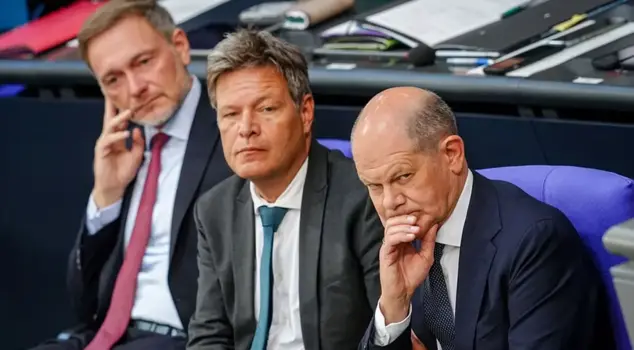
06.11.2024 23:50
In Germany, Chancellor Olaf Scholz dismissed Finance Minister Christian Lindner, who is also a coalition partner.
After the expected dismissal in Germany due to defeats in state elections, ongoing economic troubles, and discussions arising from climate goals, it was reported that Chancellor Olaf Scholz dismissed the leader of the Free Democratic Party (FDP) and Minister of Finance, Christian Lindner.
SCHOLZ REMOVED HIS COALITION PARTNER FROM OFFICE
In a report by the German News Agency DPA, citing government spokesman Steffen Hebestreit, it was stated that after a period of disagreements within the government, Chancellor Scholz removed the FDP leader from his ministerial position. Hebestreit confirmed that Chancellor Scholz dismissed the leader of the coalition partner FDP, Minister of Finance Lindner.
REJECTED THE EARLY ELECTION PROPOSAL
Reports in the national media indicated that officials from the Social Democratic Party (SPD), the Greens, and the FDP, which make up the coalition government, gathered at the Chancellery to resolve their disagreements. It was reported that FDP leader Lindner proposed early elections to Chancellor Scholz during this meeting, but Scholz rejected it. The reports noted that President Frank Walter Steinmeier also intervened due to the ongoing government crisis and is expected to meet with party leaders.
WHAT HAPPENED?
The coalition government is facing difficulties regarding the 2025 budget, the second pension package, and a growth package called "Growth Initiative-New Economic Dynamics for Germany." Particularly, the FDP's hawkish financial stance has led to disagreements among partners regarding the budget to be prepared for 2025, creating an atmosphere of government crisis in the country. Minister of Finance Christian Lindner and Minister of Economy and Climate Protection Robert Habeck presented different and independent proposals for reviving the economy. These proposals, which were not coordinated among the parties, indicated a deep division within the coalition. The coalition partners are experiencing difficulties regarding the billions of euros in deficits that need to be closed until the budget commission meets and finalizes the budget, as well as the path to exit the economic crisis.
POSSIBLE 4 SCENARIOS
If one side of the coalition separates, Chancellor Scholz could form another majority in the parliament since he was elected for four years. In this case, Scholz would dismiss the ministers of the departing side and appoint new ministers in their place. However, this scenario is not considered realistic. Polls indicate that the main opposition Christian Democratic Union (CDU-CSU), which is demanding early elections and is in the 32-34% range, is unlikely to agree to this. According to another scenario, Chancellor Scholz could form a minority government. If this happens, Scholz's government would need to find a majority in the parliament for each law. For this, he would need the support of the opposition, making it likely that passing laws would become more difficult. Another option is for the members of parliament to hold a vote of confidence against the chancellor. If the current chancellor loses the vote of confidence and a candidate for chancellor indicated by the members of parliament gains a majority, they could serve as the new chancellor. However, this would require the support of the far-right AFD party's members, and since all other parties in the parliament oppose any cooperation with the AFD, this option seems unlikely. The other and most realistic option is seen as Chancellor Scholz requesting a vote of confidence from the parliament. If the chancellor manages to gather a majority in the parliament and receives a vote of confidence, the government continues; otherwise, the chancellor may request early elections from the president. The president will make this decision within 21 days, and early elections must be held within 60 days thereafter.